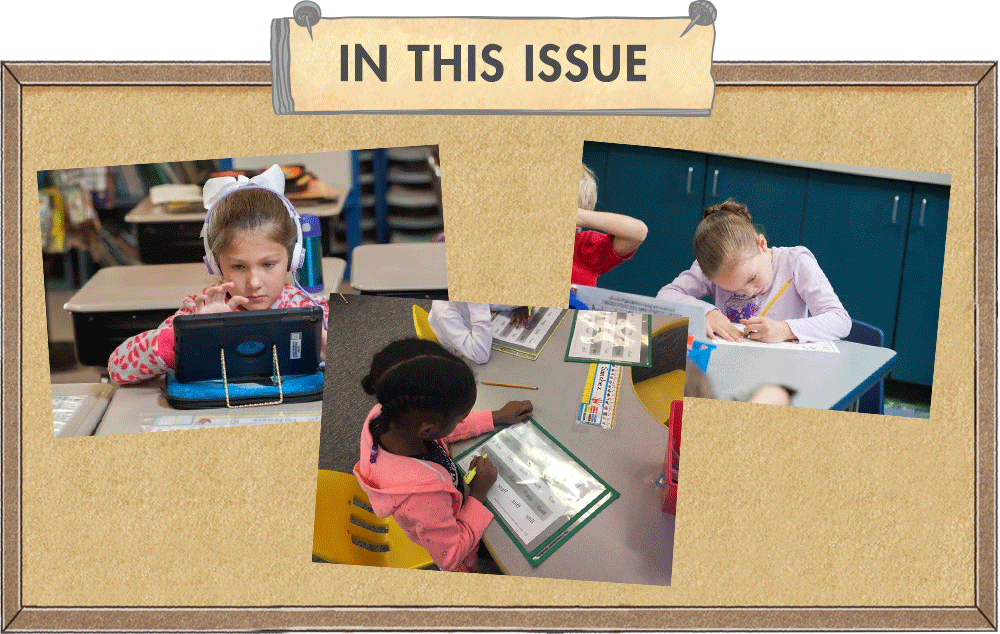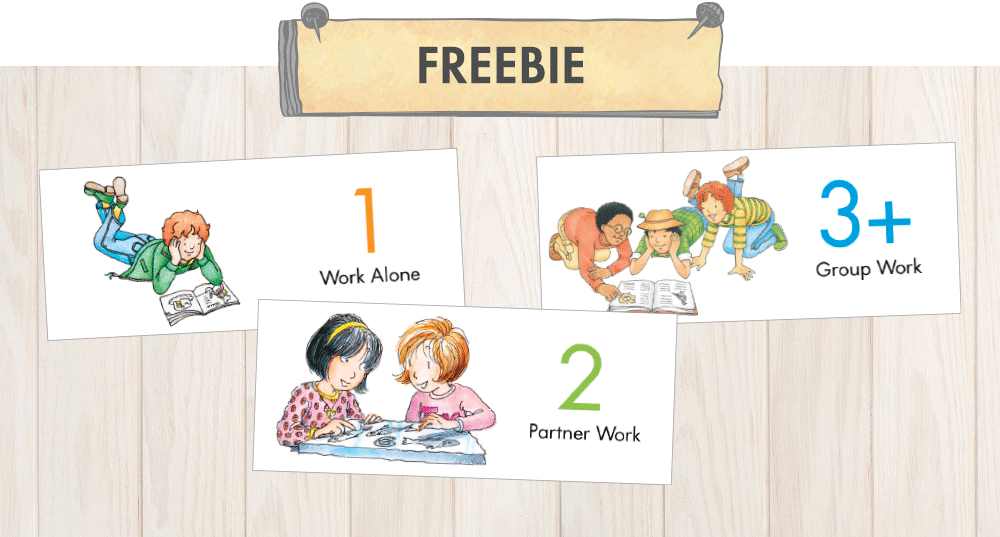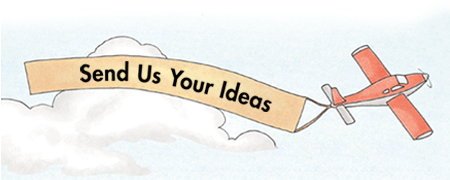|
|
|
|
ISSUE 33 | OCT. 2022
|
|

|
|
|
|
|
|
During our Superkids Schools Conference in June, the top questions asked were related to independent work time during small-group reading instruction―so we wanted to talk about it. This issue of The Superkids Bulletin includes ideas for meaningful independent work, differentiating tasks, establishing measures of accountability for assignments completed alone, and a fun classroom management freebie.
|
|
|

|
|
|
|
|
|
While you are working with a small group for guided reading or additional skill instruction, here are ten suggestions for independent activities using Superkids program resources:
1. Project Corner—Kindergartners can do the Project Corner activities found in your Teacher’s Guide.
2. Independent Activities—Select one or two activities from the Independent Activities section found in your Teacher’s Guide for each first- and second-grade reading lesson.
3. Skill Practice Pages—Children can complete Practice Pages that accompany the Word Work skills learned during each unit.
4. Reading Practice Page—After reading a library book, magazine, or Book Club selection, provide children with the Practice Page that accompanies the text read in their group.
5. Revisit Text—Children can read the text introduced in their group independently or with a partner. They can also revisit texts from previous units.
6. Reader’s Response—Students in kindergarten or first grade can write and/or draw in response to a prompt about the text they have read with their group. Second-grade students can respond in their Book Talk Journals.
7. Handwriting—Students can complete their handwriting Daily Routine. If the routine includes a sentence, students can read and illustrate the sentence(s).
8. Big Books—Partners or groups can take turns reading words from the Big Book of Blending or Big Book of Decoding.
9. Superkids Online Fun—Children can play games that correspond to unit skills and reread text alone or with a narrator.
10. Activity Pages—First- and second-grade students can use these printable game materials, found in the portal, independently or with a partner.
|
|

|
|
|
|
|
|
While Superkids provides many resources for meaningful independent work, many teachers enjoy creating their own activities. Here are a few literacy station ideas we have spotted in Superkids classrooms!
|
|

|
|
Word Building
Word building stations are ideal for K–2 independent work. Letter tiles, magnet letters, foam letters, pool noodle letters, gem letters, and block letters are all great tools for building words. To keep the station current, you can simply add new letter-sounds to the letter bin once they are taught and add an updated list of words to build.
|
|
|

|
|
Get Some Extra Mileage From Practice Pages
Many Practice Pages are ideal for revisiting again and again as an independent task. Print the page on cardstock, laminate, cut, and place in a labeled baggie. To keep the tasks current, remove the activities that review skills that have been mastered and add new activities as skills are introduced.
|
|
|

|
|
Independent Reading Extension
This teacher created a station activity to practice fluency and reinforce the phoneme students are learning. Students first read the passage two times. Next, they highlight and write all the words within the passage that include the target phoneme. Finally, they illustrate what they read about. To keep this station current, replace the passage to match the unit.
|
|
|

|
|
Spelling Station
One Superkids teacher shared she keeps Sal’s Spelling Station in place all year. She starts with introducing one spelling activity, magic spelling, and provides the materials needed to complete this activity. In a few weeks, she introduces another spelling activity and adds the materials needed to complete that task to the station. She continues to introduce new ways to practice the unit spelling words and adds the materials as needed. Eventually, students have several choices to practice their spelling words. To keep the station current, replace the spelling list for the week.
|
|
|
|

|
|
|
|
|
|
Accountability measures are a must when children are working independently. To establish accountability for independent work, clearly state the expectations before children visit a station. Provide examples of exemplary completed tasks and create checklists to ensure project directions have been completed. Below are a few other examples of how to add accountability to your independent work time.
|
|

|
|
Review Work
Remember to always check the written work students do independently and give corrective feedback as needed. Without feedback, the mistakes they make can become permanent bad habits. Checking their work also shows children that the work is important and valued, which encourages them to do their best.
|
|
|

|
|
Must Do—REDO—May Do
Many teachers use a “Must Do, May Do” format for independent work time management. One Superkids teacher suggests using a “Must Do, REDO, May Do” system. In this arrangement, students complete their must-do tasks first, but then need to return to any previously completed tasks that did not meet classroom expectations. The “Redo Station” includes a crate with one hanging folder for each student. Children must check their folder for any work that they need to complete or do again before moving to the free choice options.
|
|
|

|
|
Group and Partner Accountability
Creating tasks that are completed in pairs or groups establishes accountability among peers. Partner and group activities can include decoding or spelling words with a partner, reading aloud in pairs, playing a game with a group of friends listening for accuracy, and having a friend check completed work using a key.
|
|
|

|
|
Self-Check
When students complete a task on their own, providing a way for them to self-check their answers is a great way to give immediate feedback and offer the opportunity for correction. Place the answer key or an example of a correctly completed task in a closed folder at the station.
|
|
|

|
|
Recording, Please
Several Superkids teachers have shared, when students are asked to read independently or with a partner, they use a device to record themselves reading. When finished reading, they send the recording to the teacher.
|
|
|

|
|
Snap a Pic
When a child completes a task that cannot be turned in, such as a dry-erase activity or a card game, ask students to take and submit a picture with their device before clearing their space.
|
|
|
|
|
|

|
|
|
|
|
|
Ensuring all students can complete the assigned tasks independently, with the right amount of support or challenge, takes some planning! Here are a few ideas from Superkids coaches to help you think about supporting students with different levels of support.
|
|

|
|
Offer Scaffolds of Support
Provide varied levels of support within your station activities. For example, at a word-building station, some children may require assistance with the medial sound, but can easily determine the beginning and ending sounds on their own. Another group may only need sound boxes to help them know how many sounds are in a word. For another group, simply providing a picture and asking them to spell the word with no support will be appropriate.
|
|
|

|
|
Leveled Word Lists
When providing an activity that includes decoding or encoding words, use different word lists for each group when needed. For some children, reinforcement with the newly introduced phoneme(s) in the unit is just what they need. Another group of students may need additional practice with previously taught phonemes.
|
|
|

|
|
Task Cards
Add color-coded cards to a station to differentiate the tasks each group of students will complete. For example, at the handwriting station, each group of students can be asked to complete an extension task. Striving readers can illustrate the answer to a question related to the sentences they wrote. The on-level readers can write their answer to a “what if” question. The above-level readers can be asked to write more sentences on their own to extend the idea of the handwriting sentences.
|
|
|
|
|

|
|
|
|
|
|
Use these printable station labels to help children know if a task is to be completed on their own, with a partner, or with a group of classroom friends.
|
|
|
|
|

|
|
|
|
|